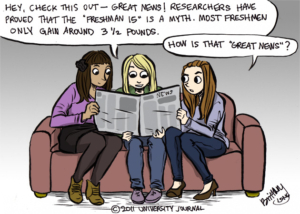Aaron RA blogs: It’s the Little Things that Matter
We are often told that in life it is the little things that matter, and this saying applies readily to health psychology. In two studies, one conducted right here in the DiSH Lab and another one in Sweden, it was found that using negative language and stigmatizing overweight individuals was directly correlated with weight gain.
Here in the DiSH Lab, a study was conducted recently which found that being labeled as “too fat” in childhood was a significant predictor of obesity in early adulthood (almost a decade later). In a related study in Sweden, researchers found that a significant increase in BMI was associated with individuals with severe obesity who were also stigmatized for their weight in the health care setting.
These studies underscore the idea that these “little things” like labeling and the language we use to describe others are not so little after all. Just being told you are overweight, or having your weight spoken about in a negative light, is correlated with weight gain in the future, and that doesn’t help anyone. In order to curb this problem, maybe it is time to start using more positive language and thinking about how what we say and how we act towards others really can affect them in the long run. In addition, more research being conducted on stigmas, body image, and the effects on weight could bring about very helpful information about how these issues relate to one another.
Blog by Aaron Lapidus

